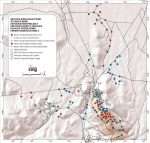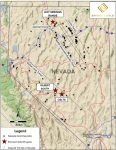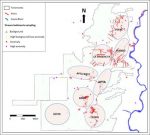
In 2014 B2Gold is targeting gold production of 410k ounces from three different mines. This would be record output for this new mid-tier, a whopping 159% increase in volume over just a couple years ago. And with its fourth mine on schedule to pour its first gold in Q4, B2Gold is looking at an annual production rate of 550k+ ounces by this time next year.
B2Gold’s methodical progression to the mid-tier-producer ranks isn’t all that surprising considering the pedigree of its management team. This is the same team after all that skillfully groomed Bema Gold into an industry icon. Veteran gold-stock investors have fond memories of Bema, a company that made them a lot of money up to 2007 when it was acquired by Kinross Gold for $3.2b. And many of these same investors believe B2Gold is building a similar legacy right before their eyes.
B2Gold has used a combination of acquisitions and organic development to expand its portfolio. CEO Clive Johnson, who was Bema Gold’s founding president back in 1988, had his new company hit the ground running after the Kinross deal. Though Johnson and team certainly could have sat on a nice warm beach counting the money they made selling their old company, they didn’t. They recognized that the gold bull market was just heating up, and sought to emulate their Bema Gold success.
B2Gold’s first move was to acquire two producing assets in Nicaragua of all places. Now this small Central American country is not somewhere that typically comes to mind when it comes to mining gold. But it is actually a great place to operate both geologically and geopolitically. And over the years B2Gold’s expert team has greatly enhanced operations to where it is now one of Nicaragua’s largest employers, taxpayers, and exporters.
B2Gold’s largest operating mine came over by way of its January 2013 acquisition of CGA Mining. The Masbate mine is located in a safe jurisdiction of the Philippines, and contains a huge cache of resources that will have it producing for decades. 2014 will be Masbate’s first full year of production under B2Gold’s ownership. And it is this operation that ultimately promoted B2Gold out of the junior ranks.
Achieving mid-tier multi-mine status over a period of only about six years is certainly impressive. But Clive Johnson and team are hardly sitting on their laurels as they target additional growth. As mentioned, B2Gold has a fourth mine in the works via its Otjikoto development project located in Namibia.
Interestingly Namibia is usually only part of the mining conversation when you’re talking diamonds and uranium. When it comes to African gold mining, it’s typically South Africa or some of the burgeoning upper West African countries getting all the attention. With only a single commercial-scale gold mine, Namibia is hardly considered a precious-metals powerhouse.
Gold deposits don’t care about borders though. And B2Gold is the proud owner of one in the desert region of north-central Namibia that is on track to double this country’s gold-mine count. B2Gold broke ground on this $244m development project in early 2013, and its Otjikoto mine is expected to pour its first gold in Q4 2014.
Otjikoto will be an excellent low-cost long-life gold-mining operation. According to the original plan, it will see annual production of 141k ounces over the first 5 years of an initial 12-year mine life. This output is expected to come in at cash costs of only $524 per ounce. And this will serve to drive down B2Gold’s overall mining costs, with operating and all-in sustaining costs projected at midpoints of $681 and $1075 respectively in 2014.
Otjikoto is also expected to deliver above and beyond the original mining plan via a low-cost expansion that will increase output by 20%+ by 2016. And this is supported by a resource base that keeps on growing as B2Gold continues to punch holes into this wide-open deposit. The latest discovery just northeast of the planned pit was found to contain 700k+ ounces that grade more than double the reserves that were used in the feasibility study.
In Otjikoto B2Gold is demonstrating its ability to organically develop a gold mine from the ground up. It acquired this project as an advanced exploration play in 2011, it successfully completed a feasibility study, and its mine build is currently on schedule and on budget. This soon-to-be vertically-integrated operation is set to be one of B2Gold’s most profitable.
With a fourth mine producing gold B2Gold forecasts total output of 555k ounces in 2015. And then when you throw in Otjikoto’s anticipated 20% bump in production along with a potential 10% expansion at its Philippines mine, B2Gold expects annual volume to exceed 600k ounces by 2017.
Though B2Gold’s growth trajectory has been quite spectacular, not surprisingly it is already looking towards its Otjikoto encore. It is of course always within the realm of possibility that B2Gold will purchase its next operating mine. But it is currently looking internally for mine #5, within its strong pipeline of advanced-stage projects.
The highest-potential candidate is the Kiaka project located in super-hot Burkina Faso. Kiaka is the newest addition to B2Gold’s pipeline, via its December 2013 acquisition of Volta Resources. And with total resources of 4.8m ounces, it contains one of the largest undeveloped gold deposits in West Africa.
This project came with a positive prefeasibility study that drew up a 10-year mining plan with annual production of 340k ounces. A large mine naturally comes with a large price tag though. And I suspect it’ll require gold prices higher than where they are today before B2Gold considers pulling the trigger on spending the $600m+ estimated to build the mine according to the PFS.
B2Gold is however performing its own feasibility study that will look at a staggered operation, focusing on a smaller higher-grade starter pit. The intent here would be to lower the capex and opex, projected at $671/ounce over the life of the mine. And if the study comes back positive, we may indeed see Kiaka’s development move forward sooner rather than later.
Overall with an unhedged rapidly growing production profile with costs that are in the lower half of industry average, B2Gold has everything going for it fundamentally. It is indeed looking like Bema Gold Part 2! [Hmm, is it possible that B2Gold’s name is a clever play on this?] And investors who realize this ought to be greatly rewarded as gold powers higher in the years to come.
Gold is obviously the primary driver of any gold-mining stock. And in the chart below we see how B2Gold has performed with its underlying metal since 2011. Visually BTG of course tracks very closely with gold. And this is backed-up mathematically with a high correlation R-square of 79% over this stretch. 79% of BTG’s daily price action is directly explainable by gold’s own.

Like most gold stocks, BTG performed very well concurrent with gold as the metal soared to its 2011 all-time high. But what I want to focus on is how BTG has performed subsequent to this high, over a period where gold consolidated and then fell hard in 2013’s anomalous plunge.
The last few years have no doubt been rough for the precious-metals sector, which has been a shell shock for folks who’ve enjoyed a decade-long run that took all its assets from the lower left to the upper right. And the mining stocks have taken the biggest beating, which is not too surprising given their tendencies to amplify the performances of their underlying metals.
To demonstrate this amplification, or leverage, consider how the gold stocks performed when gold was down 37% from its 2011 high to 2013 low. The popular GDX Gold Miners ETF, which is comprised of the stocks of the world’s best-of-the-best gold miners, took it on the chin with a 69% loss from its 2011 high to 2013 low. And things were even worse for the smaller miners, with the GDXJ Junior Gold Miners ETF down a breathtaking 81% from peak to trough. These dismal losses make BTG’s high-to-low drop of 58% not look all that bad!
B2Gold’s muted loss compared to the sector actually shows relative strength. And as you can see in this chart, BTG really flexes its muscles on the upside. Any time gold mustered a meaningful rally, BTG blasted higher.
The first two pops came off gold lows in late 2011 and mid-2012. Following the initial and healthy correction off its all-time high, gold consolidated in a high band with $1550 as strong support. And investors piled into BTG both times it bounced off this support. In each occurrence gold rallied 15%, while BTG soared higher by 66% and 59% respectively. These spectacular gains represented outstanding positive leverage to the metal, to the tune of 4.4x and 3.9x!
This $1550 support ended up catastrophically failing in early 2013. And gold continued to fall without much relief for another three months to its June low, with BTG naturally following suit. But when investors finally got a whiff of a relief rally, they again piled into this mid-tier’s stock. Gold jumped a solid 18%, with BTG popping 84% higher for 4.7x positive leverage.
Rather frustratingly gold ended up giving back all its gains to achieve a secondary multi-year low in December. And as would be expected, BTG sold off as well. This low ended up being the springboard for the latest rally. And BTG has again greatly impressed with a 69% gain to gold’s 16% (4.3x leverage).
Overall as you can see BTG offers investors awesome positive leverage when gold moves higher. Over the last four uplegs this stock has delivered an average of 4.3x positive leverage to the metal. And this destroys what its peers have done, with GDX and GDXJ leveraging an average of 1.9x and 2.8x respectively over these same four gold uplegs.
B2Gold really is in the sweet spot of gold-mining stocks. It is diversified enough to hedge operational risk. Its assets have longevity (18m+ ounces of resources in all categories). Its low-cost unhedged production allows for strong future cash flow. It has a strong balance sheet relative to its peers. It has a great track record. It has a strong growth pipeline. And its market capitalization is small enough to where it won’t take much capital inflow to send its stock way higher.
If gold forges a path higher, as we expect it to, there’s no reason to believe that B2Gold won’t continue to outperform the sector. And for the reasons above and many more, this company ranks as one of our favorites in our brand-new hot-off-the-presses research report.
This latest report focuses on mid-tier gold producers. We closely examined the universe of stocks that list in the US and Canada, and chose our favorite dozen to fundamentally profile. On an annual basis these miners produce from just under 200k ounces on the low end, to just over 1.0m ounces on the high end, while averaging 490k ounces. This group has great diversification, with mines in 19 different countries on 6 different continents. And in general they produce their gold at cash costs in the lower half of industry average.
Like B2Gold these companies also have great growth prospects. Some are pursuing brownfield expansion, some are advancing large exploration projects, and some are actively constructing their next mines. To get more detail on B2Gold and the other 11 elite high-potential mid-tiers, buy your report today! These are the stocks that should lead this sector higher as gold continues to run!
The bottom line is B2Gold is a new mid-tier gold producer that has its sights set on continued growth. It operates three excellent mines, and is developing a fourth that is poised to greatly enhance its production profile. B2Gold’s management team has put together a strong portfolio of projects. And their track record ought to give investors confidence in their ability to execute.
Investors have indeed latched onto this company. And this is apparent in the performance of B2Gold’s stock in response to its underlying metal. BTG has greatly outperformed gold and the other stocks in its sector. And it ought to continue to do so going forward.
Scott Wright of Zeal LLZ, Guest Contributor to MiningFeeds.com



 Follow us on Twitter
Follow us on Twitter Become our facebook fan
Become our facebook fan











Comments are closed.